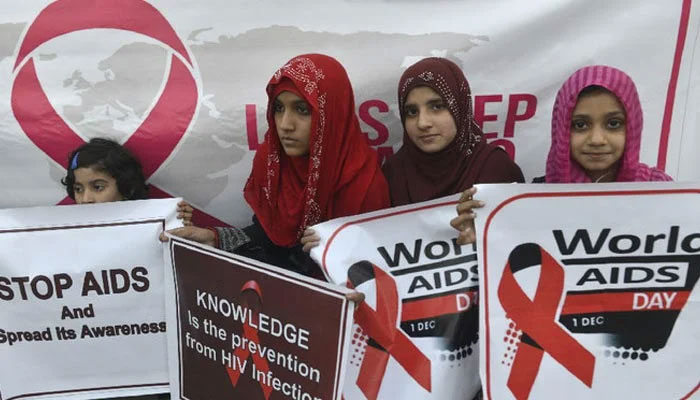World AIDS Day
In Pakistan, number of HIV cases is steadily increasing, particularly among vulnerable groups like drug users
December 1 serves as a poignant reminder to honour the lives lost to AIDS and to renew global efforts in combating the disease. Since the advent of the epidemic, over 36 million people have died from AIDS-related illnesses worldwide. For much of its early history, the disease was cloaked in stigma and misinformation. Many patients, fearing ostracisation, kept their diagnosis secret. Families, under the erroneous belief that AIDS spread through casual contact, often isolated their loved ones, amplifying the suffering of those already facing a terminal illness. In Pakistan, while the prevalence of AIDS remains relatively low, the number of HIV cases is steadily increasing, particularly among vulnerable groups such as drug users, transgender individuals, and prisoners. These communities often occupy the margins of society, deprived of adequate care and attention. This marginalisation reflects broader societal neglect and exposes systemic gaps in addressing public health crises.
Unfortunately, the momentum built by media campaigns in the 1990s to raise awareness about AIDS has largely dissipated. Little has been done in recent years to educate the public or empower them with the knowledge necessary to confront the disease. Structural deficiencies in Pakistan’s healthcare system exacerbate this issue. A glaring example is the Sindh scandal, where hundreds of children contracted HIV due to medical negligence – an incident that underscores the urgent need for stricter regulatory oversight and comprehensive healthcare planning. World AIDS Day is also a moment to call upon global leaders to champion equitable healthcare. Access to affordable treatment remains a significant challenge, particularly in low-income countries. The debate in the US over allowing pharmaceutical companies to set exorbitant prices for life-saving drugs highlights the ethical dilemmas that persist. Global observances like this should push for policies that ensure affordable medication, especially for underserved populations.
Public awareness campaigns must be reinvigorated, starting with schools and colleges, to educate young people about AIDS and encourage them to support affected individuals. The collective effort seen during the Covid-19 pandemic – where countries collaborated to develop treatments and distribute vaccines – offers a model for addressing other health crises. Health is the cornerstone of any nation’s progress. Economic growth and geopolitical ambitions mean little without a healthy population to sustain them. It is time for governments, civil society, and individuals to prioritise healthcare, not just in words but through actionable policies and initiatives. Let December 1 be a catalyst for change – a day more to mobilise than anything else.
-
 Iran Tensions Rise As Trump Says He Is 'not Thrilled' With Nuclear Negotiations
Iran Tensions Rise As Trump Says He Is 'not Thrilled' With Nuclear Negotiations -
 Where Is Calvin Klein's Wife Kelly Klein Now After Divorce And Fashion Fame?
Where Is Calvin Klein's Wife Kelly Klein Now After Divorce And Fashion Fame? -
 Kourtney Kardashian’s Role As Stepmother Questioned
Kourtney Kardashian’s Role As Stepmother Questioned -
 Neil Sedaka Dies At 86 After Hospitalisation In Los Angeles
Neil Sedaka Dies At 86 After Hospitalisation In Los Angeles -
 'Lizzie McGuire' Star Robert Carradine's Reason Of Death Laid Bare
'Lizzie McGuire' Star Robert Carradine's Reason Of Death Laid Bare -
 Lisa Rinna Breaks Silence After Recent Reunion With Andy Cohen: 'I've Pissed Him Off'
Lisa Rinna Breaks Silence After Recent Reunion With Andy Cohen: 'I've Pissed Him Off' -
 Savannah Guthrie Mom Update: Unexpected Visitors Spark Mystery Outside Nancy's Home
Savannah Guthrie Mom Update: Unexpected Visitors Spark Mystery Outside Nancy's Home -
 Elle Fanning Shares Detail About Upcoming Oscars Night Plan With Surprise Date
Elle Fanning Shares Detail About Upcoming Oscars Night Plan With Surprise Date -
 Demi Lovato Spills Go-to Trick To Beat Social Anxiety At Parties
Demi Lovato Spills Go-to Trick To Beat Social Anxiety At Parties -
 Benny Blanco Looks Back At The Time Selena Gomez Lost Her Handrwritten Vows Days Before Wedding
Benny Blanco Looks Back At The Time Selena Gomez Lost Her Handrwritten Vows Days Before Wedding -
 Naomi Watts Reveals Why She Won't Get A Facelift In Her 50s
Naomi Watts Reveals Why She Won't Get A Facelift In Her 50s -
 Travis Kelce's Mom Donna Fires Back At Critic With Sarcastic Reply After Body Jab
Travis Kelce's Mom Donna Fires Back At Critic With Sarcastic Reply After Body Jab -
 Kendall Jenner Gets Candid About Her Differences With The Kardashian Clan Over Style Choices
Kendall Jenner Gets Candid About Her Differences With The Kardashian Clan Over Style Choices -
 Sam Altman Opens Up About OpenAI, Anthropic, Pentagon Conflict
Sam Altman Opens Up About OpenAI, Anthropic, Pentagon Conflict -
 Brenda Song Confesses Fascination With Conspiracy Theories
Brenda Song Confesses Fascination With Conspiracy Theories -
 Lunar Eclipse 2026: Time, Date, Sighting Locations, Know Every Detail
Lunar Eclipse 2026: Time, Date, Sighting Locations, Know Every Detail




